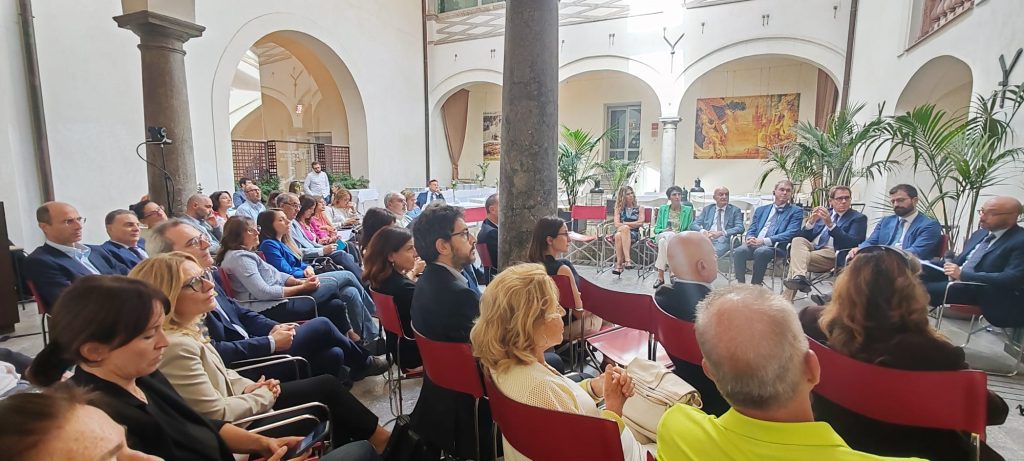Palermo, October 17th 2024 – The most recent studies have proved that that there is a correlation between the invisible community of bugs, viruses and fungi living in our intestine and the way the immune system functions. Moreover: an unhealthy “gut” might be responsible for a wide spectrum of diseases, such as anxiety and depression. Are we close to a scientific explanation for the so called “gut feeling”?
In the light of this, the Fondazione RiMED has launched the scientific symposium entitled “Nutrition, Microbiome and Metabolism” that will take place in Palermo today and tomorrow. The symposium represents a multidisciplinary meeting aiming at exploring nutritional health by mean of the most advanced research, ranging over the psychobiology of food intake – with Prof Finlayson from Leeds University – to the discovery of multireceptor drugs for obesity – Prof Tschöp of the University of Munich speaks – to the dramatic effects of emulsifiers and ultraprocessed food on our microbiota – Dr Paraskevopoulos of the European Food Safety Authority represents.
“I am thrilled to welcome these extraordinary speakers, I can count more than twenty colleagues coming from all over the world to join our symposium, that has all the characteristics to be a top-notch event”, Giulio Superti-Furga, chairman and Scientific director of the upcoming RiMED research center in Carini, said. “Studying the interaction with the surrounding environment is the key to understand human health, and Sicily is the ideal place to study this interaction according to an “One Health” vision: talking about nutrition, let’s just think of the so called Mediterranean diet”.
For the first edition of the RiMED symposium, the scientific director Superti-Furga has chosen to talk about food as exogenous element to interact with human health: addressing this interaction will allow the identification of alternative preventive, diagnostic and therapeutic treatments as well as targeted therapeutics, also in the light of the launch of the RiMED research center.
Maria Rescigno, worldwide recognized immunologist, is one of the pioneers on the research on microbioma and nowadays she is one of the most influent expert in the world; on top of this, she is co-chairing today’s Ri.MED symposium: ”Thanks to the modern techniques of genome sequencing, today we know that we are “more microbes than humans”, and what I mean is that our body contains more bugs than human cells. We must realize that in our body there is a real ecosystem, on the equilibrium of which our health relies: intestinal dysbiosis is a microbe disequilibrium caused by the excessive overgrowth of “nasty” bacteria. A wrong diet negatively affects our defenses, alters the immune system and may be the cause of many kinds of diseases, including tumors. Moreover, according to Professor Rescigno “there is a mutual connection between intestine and brain; for instance, a permeable intestine may cause leak of inflammatory mediators, dangerous for the whole organism, especially for the brain”.
This means that – at least theoretically – it is actually possible to prevent and cure pathologies such as anxiety and depression, but also different neurodegenerative diseases by preserving an healthy intestinal barrier. This was one of the topics discussed during the Round Table, a educational event organized by the RiMED Foundation that took place in the early afternoon, waiting for the official kick–off of the meeting, with the aim of gathering the main actors in the field to share knowledge on the topics related to nutrition.
Experts if the field confronted each other discussing about prevention and how to keep a healthy microbiome (i.e. mainly by eating healthy and variegated food), but also about gender research: Professor Hellas Cena, Doctor specialized in nutrition, highlighted how personalized nutrition can efficiently contribute to women welfare. Doctor Alessandro Mattina, chief of the Diabetology Unit of IRCCS-ISMETT, described complications and comorbidities associated to the metabolic syndrome, diabetes and obesity, and all pathologies related to nutrition. Following, Prof Camillo Ricordi talked about “sick longevity” as the worst pandemic of our time: over 90% of people aging above 60 suffers of at least one disease, with an obvious huge economic impact on society, costing around 38 trillion dollars per year.
“Aim of the symposium is to gather in Palermo, the most influent international experts in order to create a profitable occasion to debate and interact about scientific innovation, thus enriching competitivity all over the territory” Paolo Aquilanti, President of the RiMED Foundation, said. “To share new ideas and discoveries among researchers, become necessary in order to face the complexity of the future scenarios and plan new solutions”.
Born from an international partnership between the Italian government, the region Sicily, the CNR, the University of Pittsburgh and UPMC, today RiMED can rely on more than 100 researchers, it has consolidated more than 30 patents and is approaching an incredible moment of growth, in the view of the new research center in Carini.

